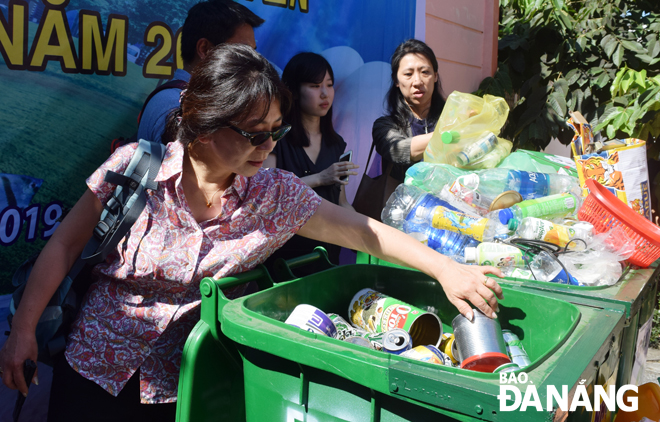UNDP-partly funded waste treatment project commences in Da Nang
Work has started on a United Nations Development Programme (UNDP)-partly funded project for building a pilot integrated waste management model to reduce the amount of generated waste, optimise trash classification at source, and recycling schemes in the districts of Ngu Hanh Son and Hoa Vang.
 |
| Foreign experts guiding Da Nang’s residents on how to classify garbage at the source in appropriate manner |
The project is be implemented within 18 months by the Da Nang Women's Union, the municipal Department of Natural Resources and the Environment, UNDP and the Global Environment Facility’s Small Grants Programme (GEF SGP) at a total cost of nearly 3.4 billion VND.
Of this figure, over 1.5 billion VND is from the UNDP-offered non-refundable aids, whilst 480 million VND is from the Vietnamese government's reciprocal capital, and the remainder is totally worth of equipment and machines under Da Nang-approved plan for at-source waste classification promotion to 2025.
Under the project, the emphasis will be placed on organising contests to seek optimal initiatives in plastic waste collection, treatment and classification.
Also, appeals for public involvement will be made to implement such highly practical campaigns of using banana leaves instead of plastic for packaging vegetables, making organic fertilizers, and ensuring plastic waste- free tourist attractions, and collecting, classifying and minimising the discharge plastic waste into the environment.
These schemes are highly expected to optimise trash classification at source, reduce the amount of generated waste, especially used plastic items.
The project comes amidst public fears over the possibility that globally the volume of plastic waste going into the ocean is set to quadruple between 2010 and 2050, meaning that the sea could contain more plastic by weight than fish by mid-century, according to a report released by the World Wide Fund for Nature (WWF) on February.
By THANH TINH – Translated by A.T







